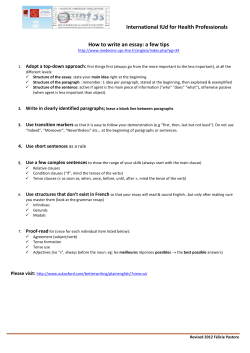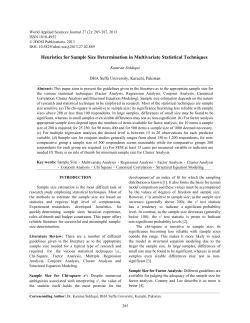
Contract Management Flaws that are Submarining your Business SURVEY REPORT
SURVEY REPORT Contract Management Flaws that are Submarining your Business Key Results from the 2014 Contract Management Survey, powered by Apttus More often than not, sales figures are the metric used to measure a company’s performance. But it’s your Legal Department that has the most significant impact on the bottom line. Inefficiencies that start there have a ripple effect throughout your entire business. Recently, Apttus conducted a survey to understand how Legal departments in Fortune 1000 companies are performing in regard to contract management and process efficiency. The results reveal that many companies are negatively impacted by poorly optimized processes, wasted legal expertise, and a general lack of visibility into contract obligations. But more importantly, when the legal suffers, so does the rest of your enterprise. This report identifies the three critical obstacles that start in Legal, but impact companywide goals. It also outlines best practices that can help organizations solve some of these pressing issues. © 2014 APTTUS SURVEY REPORT About the Survey Many companies underestimate the amount of manual processes used throughout their organization, increasing their chances of error and compliance risk, as well as adding to overall labor and costs. Apttus assessed the impact automation and e-signature can have on your contract lifecycle management processes by launching a world-wide benchmark survey. The survey consisted of 30 questions about a company’s current solution set, and was aimed at measuring the visibility and effectiveness of contract management. More than one-hundred respondents from Fortune 1000 companies, representing a wide spectrum of industries, were polled. Below is a visual breakdown of respondent demographics: About the Respondents By Company Size By Business Department (# Employees) By Industry © 2014 APTTUS 2 SURVEY REPORT The Results at a Glance 40% of legal departments lack insight into critical contract information 44% of respondents identified ‘process efficiency’ as a leading barrier to their company’s revenue goals 1 in 3 companies have 10+ contract repositories 71% respondents say less than half of their contracts are searchable by keyword and metadata 84% of legal departments are unable to run reports on their contracts, leaving them blind on important data 44% of companies said it takes more than two days to execute a standard non-disclosure agreement © 2014 APTTUS 3 SURVEY REPORT Grasping the Impact of Your Legal Department When Legal Struggles, Your Company Suffers Whether you recognize it or not, Legal is more than just a necessary cost center within their business. More than 80% of transactions are tied to a contract – and these critical documents outline who is paying you, what amount they’re paying you, how long they’ll be paying you, penalties for agreement violations, compliance risk – the list goes on. Armed with insight into your contracts, Legal is empowered to make better business decisions, and simplify operations across your finance, sales, and executive teams. However, contract management isn’t an area where most companies focus their attention. And when it comes to growing revenue, contract management is often than not it’s viewed as a necessary evil, a source of heartburn within the company, riddled with risk, bottlenecks and siloed processes. Because contract management is at the crux of everything a company does, when a legal department is inefficient it has a noticeable outward effect on the rest of the company, including a direct impact on customer relationships, Days Sales Outstanding (DSOs), top and bottom line revenue, and company liability. Respondents without an automated contract lifecycle management system struggled with the following: 69% 60% 57% 62% Don’t have standard processes Are viewed as not responsive Don’t know customers’ needs Aren’t quick to follow up with commitments 61% Aren’t easy to do business with These should be alarming numbers, regardless of your role within the company. It’s a customer’s world, and speed, convenience, and efficiency are everything. If you can’t deliver that, you won’t be asked to deliver much at all. Let’s take a closer look at what exactly causes these complexities within Legal and their contract management. © 2014 APTTUS 4 SURVEY REPORT Why Legal Departments Struggle The Three Stumbling Blocks for Contract Management . Top Barriers to Achieving Revenue Goals 1. Poorly Optimized Processes Insight into Customers Contract management, which can be a very complex and time-consuming process, is made worse by disjointed, manual steps. Sales Effectiveness Process Efficiency Numerous stakeholders are involved throughout the contracting process, and aligning their goals is a continuous challenge. Sales pushes for speed, while Finance is concerned with accuracy, and Legal works to highlight and eliminate organizational risk. Legal is the only check between what’s defined in an agreement and the departments managing obligations and deliverables. All the while, the components within the contract itself are loaded with many moving parts and ever changing variables. And without an automated solution, all of these tasks are managed across various platforms and software programs. Pricing is typically done with spreadsheets. Clauses and terms are written in Word. Approvals are done over the phone, via text or in e-mails. Throughout the juggle of managing versions, pricing and approvals, inefficiency and risks are introduced by members of the legal team having to manually input the data between various programs, which is redundant, time-consuming work. Manual steps in the process lead to human error, stagnated contract cycles, limited process control, minimal risk management and no contract performance visibility. The results are missed obligations, unachieved negotiated terms, reduced revenues, increased costs and low compliance. Add in the high volume of contracts most of our respondents deal with on a regular basis,* and contract management quickly becomes a burden. Aberdeen Research group estimates that ineffective contract management costs business $100 billion per year in missed cost savings. Entering New Markets Monetizing Acquisitions Changing Markets Sales Channel Productivity Technology Infrastructure Key Statistics 70% respondents report having 5 or more involved in handling or managing contract administration 44% said it takes more than 2 days to execute a standard non-disclosure agreement (NDA) 50% say the average contract requires 5 or more changes before it’s executed More than 1/3 say that four or more people are required to approve a contract before it’s executed *57% say they generate 100+ contracts a month; 54% report having 500 active sales contracts with 7.5% having more than 10k active © 2014 APTTUS 5 SURVEY REPORT 2. Wasted Legal Resources In many organizations, the contracting process is a source of discord and expense, with lawyers accused of obstructing rather than enabling business growth. The reality is that Legal’s purpose in an organization is to protect the company risk – and the only way to do that is to ensure agreements contain the correct terms and conditions. Unfortunately, legal often lacks the resources to review every contract, yet is nervous about empowering unqualified staff to make important legal decisions. To solve this conundrum, Legal teams must get more effective and efficient, so they can do more with the resources they have. The best way to accomplish this is through technology. Large companies that lack a centralized legal playbook and effective clause library, waste a tremendous amount of time and energy on avoidable tasks such as running down outdated legal language, or managing a high volume of non-standard terms. It creates a constant confusion and friction in regards to the contract manager role. Lawyers become overqualified, expensive administrative resources, wasting their expertise on standard processes rather than the work that really matters. And while teams of paralegals and contract managers might be a cheaper option, with an expertise more geared towards the business side of things, they often bear responsibility without possessing the appropriate authority. Either way, both are ill-equipped to meet the two fold of demands. Statistics such as the ones to the right, are strong indicators of misappropriated legal resources. Contracts being housed in a variety of different places, non-standard clauses, and unsearchable contract terms will all chew up the time and energy of your legal team. © 2014 APTTUS Key Statistics Over 43% of respondents said their sales agreements contain non-standard or custom terms at least half the time 42% said that less than half of their contracts are created from templates More than 71% say that less than half of their contracts are searchable by keyword and metadata More than 1/3 report having 10+ repositories 6 SURVEY REPORT 3. General Lack of Visibility Legal is often asked to “see around corners” and manage risk for the organization, but when Legal lacks visibility into contract terms, obligations and value, this is an unachievable task. Visibility doesn’t just include the ability to find a contract—it also includes the ability to track a multitude of change forms and amendments associated with each contract, and to quickly assess how a deal has changed over time. But you can’t control what you can’t see, which is a troubling notion considering Legal is charged with managing the enterprise’s risk. Nonetheless, 40% of legal departments lack the necessary insight into critical contract information. This becomes a major pain point because agreements outline the terms of the value exchanged, and if you can’t ensure you are getting the right value for your deals, money is slipping through your company’s fingers. It becomes impossible to track expiring contracts and renewal opportunities, contracts with less favorable terms too frequently autorenew, and the business is paying more for contracts than they should be. Not only are you leaking revenue from your topline, but if you can’t identify what’s wrong, you will never be able to fix it. Effective contract management makes it easy to keep up with contract revisions, changing regulations, and updates to legal language and policies across the enterprise. So what steps should you take to shore up these holes? Very Easy Fairly Easy Fairly Difficult Very Difficult Impossible Key Statistics © 2014 APTTUS 25% companies don’t know how many sales contracts they have active during a month 4.5% don’t know how many professional resources are involved throughout the contract management process ~20% are unsure of how many changes to the contract are made throughout contract management process More than 46% did not know the average amount of spend tied to their vendor contracts ~50% of the respondents don’t know how much spend occurs outside of approved contracts 84% are unable to run reports on terms in their contracts 7 SURVEY REPORT . Correcting Contract Management 3 Quick Steps to Enhance Your Legal Processes 1. Centralize Your Contracts Contracts seem to live almost anywhere in an enterprise – spread across electronic repositories like employee hard drives, network file shares, emails, or stored as hard copies in desk drawers or file rooms. Locating and identifying all of the active agreements and contract templates may require you to take an approach similar to electronic discovery. And doing so in a proactive manner could help you avoid locating them in an actual eDiscovery moment as a result of litigation. But by centralizing all of these agreements in a singular accessible repository, your legal department will have greater visibility into active contracts, what language is being used, what clauses are more effective than others, and can begin to curb the use of non-standard terms. The best way to control the legal language is by establishing a clause library with pre-defined and approved legal clauses that can be inserted into contracts by your own staff, or in some cases, in to third party contracts that you are reviewing. If language in a clause needs to be changed down the road, having a central repository allows for single updates to be replicated through many contracts rather than having to make changes to multiple clauses in multiple locations/templates. Inevitably this will allow you to increases efficiency while at the same time reducing the risk of business folks using the wrong or outdated language. 2. The ROI of Effective Contract Management 50% shorter contracting lifecycles 25% higher contract renewal rate 1-2% more revenue 30% lower administrative costs 2-7% lower material/service costs 55% stronger compliance management Embrace Automation Automating contract management helps companies mitigate risks and bottlenecks while significantly shortening contract creation time and eliminating manual work. When your contract process is automatic, and contracts © 2014 APTTUS 8 SURVEY REPORT are centrally located with changes tracked in real time, it’s easy to keep even remote teams up-to-speed and error-free. Start by automating your legal playbook, which is the enormous notebook with rules and policies for contract managers to consult as they assemble contracts. Many senior contract managers will have this playbook memorized, pulling out individual clauses based on specific parameters. Instead of having contract managers pick out clauses manually, which is both time consuming and error prone, you can automate the process based on conditional rules and stored metadata, saving both time and ensuring 100% accuracy. Trigger divergent paths for the contract lifecycle based on data attributes in the contract record (“playbooks”) and activate alerts for key milestones of the contract process or the contract lifecycle itself. Embedding the legal know-how into automated playbooks and workflows allows legal to focus more on the significant deals rather than spending time on the day-to-day standard transactions. “Legal is often viewed as a reactive cost-center. But as this survey indicates, positioning the legal department as a proactive strategic business unit, aligned with the organization’s goals, can improve revenue, customer service and reduce risk.” says Jason Smith, Senior Director and Legal Counsel for Apttus With automation your legal department will finally shed the poorly optimized processes. You will start to see significant business value, such as broader collaboration, end-to-end process support, and faster contracting cycles. By adding features such as e-signature, you can also eliminate manual, paper-based work. 3. Streamline Your Processes with Quote-to-Cash If contract management isn’t an integrated part of your Quote-to-Cash process, you are missing opportunities to streamline processes and increase efficiencies not just within Legal, but across the organization. Quote-to-Cash is the end-to-end business process that occurs between the buyer’s interest in a purchase and the final realization of revenue. It includes proposal and quote creation, contract negotiation, order fulfillment, billing, revenue recognition, compliance management, and more—all within a visible and controlled workflow. Quote-to-Cash solutions include Configure Price Quote (CPQ), Contract Lifecycle Management and Revenue Management. © 2014 APTTUS 9 SURVEY REPORT “Aberdeen Research group estimates that ineffective contract management costs business $100 billion per year in missed cost savings.” Contracts are the physical output of your deals. When your CPQ process feeds directly into your contracts, you achieve better efficiency and accuracy, and increase revenue velocity and customer satisfaction. Not to mention, when contract data can be automatically leveraged to drive renewals down the road, you can easily track and increase your average customer lifetime value. Legal is the heart of your business, but it’s time the rest of the company had its finger on the pulse. Closing Comments Contracts are essential to your business, which means an effective contract lifecycle management system is critical. Terms and important deal details are found in your contracts and visibility into these agreement drives a more successful customer relationship and makes revenue recognition easier. Having increased visibility and actionable data around all contract terms will allow your business to both streamline sales cycles and effectively manage revenue. Technology like this enables non-lawyers to be self-sufficient during the contract lifecycle, while still operating within the framework of legal’s guardrails. Reducing the number of inquiries made to legal for routine and standard contacts allows them to focus on more important tasks or more complex deals that require increased focus and attention. The result is a synergy between the commercial and legal sides of contract management where speed is no longer sacrificed for risk management and contract managers, whether layers or not, are empowered to actually manage rather than just administer, the contracting process. Apttus will continue to conduct market research to identify further points of friction in both critical Legal processes as well as sell-side business processes and ways to improve them. About Apttus Apttus, the category-defining Quote-to-Cash software company, drives the vital business process between the buyer’s interest in a purchase and the realization of revenue. Apttus is delivered on the Salesforce1 Platform, the world’s most trusted and comprehensive cloud delivery infrastructure. Applications include Configure Price Quote (CPQ), Renewals, Contract Management and Revenue Management. Additionally, Apttus’ patent pending X-Author technology enables Microsoft Office to be a user-interface with full interaction and control between Salesforce and Microsoft Office. Apttus is based in San Mateo, California, with additional offices in London, UK, Bozeman, Montana and Ahmedabad, India. For more information visit: apttus.com. © 2014 APTTUS 10
© Copyright 2025





















